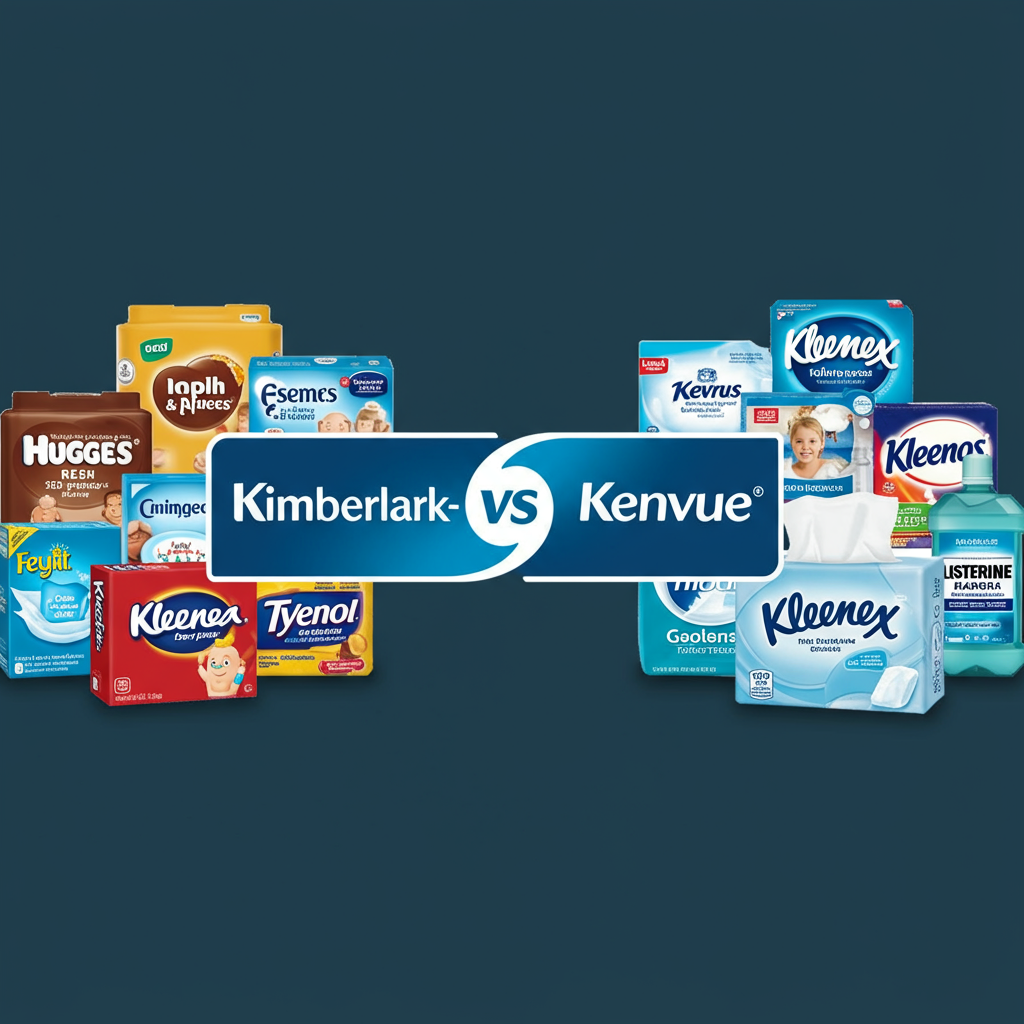In a landmark move set to reshape the global consumer health and personal care landscape, Kimberly-Clark, the powerhouse behind Huggies diapers and Kleenex tissues, has announced its acquisition of Kenvue, the company responsible for Tylenol, Listerine, and other iconic brands. Valued at a staggering $48.7 billion, this Kimberly-Clark Kenvue acquisition marks one of the year’s most significant corporate consolidations, promising to create an unparalleled consumer products conglomerate touching nearly half the world’s population. The strategic union aims to blend complementary product portfolios, drive innovation, and capitalize on evolving consumer demands, though it faces notable risks, including ongoing legal scrutiny surrounding Tylenol.
The Unprecedented $49 Billion Union
The deal, a cash-and-stock transaction, sees Kimberly-Clark paying a significant premium for Kenvue shares. Kenvue shareholders will receive $3.50 in cash and 0.14625 Kimberly-Clark shares for each Kenvue share, totaling $21.01 per share. This represents a substantial 46% premium over Kenvue’s pre-announcement closing price. Following the news, Kenvue’s stock soared over 16% in early trading, while Kimberly-Clark’s shares experienced a nearly 13% decline. This Huggies Tylenol merger is expected to close in the second half of 2026, pending shareholder and regulatory approvals.
A New Consumer Giant Emerges
The combined entity will boast an impressive roster of ten billion-dollar brands, projecting an annual net revenue of $32 billion by 2025. This integration brings together beloved household names from both companies, including:
Kimberly-Clark: Huggies, Kleenex, Cottonelle, Scott, Viva
Kenvue: Tylenol, Band-Aid, Listerine, Neutrogena, Johnson’s Baby, Clean & Clear, Aveeno, and Depends adult diapers
This formidable lineup creates a diversified portfolio spanning baby care, feminine hygiene, adult incontinence, pain relief, oral care, and skincare. The move underscores a broader strategy to dominate key consumer health categories across all life stages, from infancy with Johnson’s Baby and Huggies to adulthood with Tylenol and Depends.
Strategic Vision: Why This Merger?
Kimberly-Clark’s Chairman and CEO, Mike Hsu, expressed immense enthusiasm for bringing together “two iconic companies” that share a deep commitment to scientific and technological advancement. The acquisition aligns with Kimberly-Clark’s strategic goal of focusing on higher-growth and higher-margin businesses, particularly in response to recent economic pressures and shifting consumer preferences.
Blending Expertise for Innovation
The Kimberly-Clark Kenvue acquisition is more than just a financial transaction; it’s a strategic alignment of core competencies. Kenvue, spun off from Johnson & Johnson in 2022, occupies a unique market position, bridging traditional consumer-packaged goods (CPG) with healthcare. This specialized focus on science-backed innovation and strong relationships with healthcare professionals, including doctors and dentists, offers significant advantages. Kimberly-Clark plans to leverage its extensive expertise in customer partnerships and marketing to accelerate the growth of Kenvue’s health portfolio. Conversely, Kenvue’s robust R&D capabilities will enhance the combined company’s capacity to develop new, science-driven solutions for evolving consumer health needs. This collaborative approach is expected to drive enhanced product development and marketing strategies globally.
Navigating the Complexities and Risks
Despite the enormous potential, the Huggies Tylenol merger comes with considerable risks and challenges. Kenvue has faced recent headwinds, including an overall sales decline of 4.4% and a 5.3% drop in its self-care unit (which includes Tylenol) for the quarter ending September 28. These declines were attributed to “trade inventory reductions” and consumers potentially opting for cheaper, private-label alternatives amidst economic strain.
The Tylenol Litigation: A Critical Hurdle
Perhaps the most significant challenge facing the newly combined entity is the ongoing legal scrutiny surrounding Tylenol. This intensified after President Donald Trump made unsubstantiated claims linking Tylenol use during pregnancy to an increased risk of autism. These claims sparked a sharp decline in Kenvue’s stock and led to legal action. Texas Attorney General Ken Paxton filed a lawsuit against Kenvue (and Johnson & Johnson), alleging deceptive marketing practices regarding Tylenol’s safety for pregnant women.
Both Kenvue CEO Kirk Perry and Kimberly-Clark CEO Mike Hsu have vehemently defended Tylenol’s safety. They emphasized that the product’s safety has been studied for decades and is firmly supported by scientific and medical consensus. Medical experts and regulators consistently state that there is “no credible evidence” establishing a link between acetaminophen (Tylenol’s active ingredient) and autism. Mike Hsu confirmed that Kimberly-Clark’s board “carefully considered all the risks and opportunities,” consulting with “medical, regulatory and legal experts” before proceeding with the deal.
Economic Headwinds and Consumer Shifts
Beyond the Tylenol controversy, the combined company will need to navigate a dynamic economic environment. Consumers, especially those facing cash constraints, are increasingly “trading down” to more affordable private-label options. The reliance on a lineup of premium name-brand products could be a risky bet if economic pressures persist, requiring strategic pricing and marketing efforts to maintain market share and brand loyalty. The integration of two massive corporate cultures and distinct operational frameworks also presents a significant management challenge.
The Broader M&A Landscape
This Kimberly-Clark Kenvue acquisition is part of a larger trend of resurgent merger and acquisition activity. The deregulatory environment under the Trump administration has contributed to an explosion in dealmaking. At nearly $50 billion, this acquisition ranks as the third-largest acquisition of 2025 and the fourth-largest consumer products deal of all time. After a post-pandemic slowdown, M&A activity has roared back, with $1.9 trillion in U.S. deals so far in 2025, on track to surpass 2015 levels. This surge reflects a strategic imperative for companies to consolidate, achieve economies of scale, and gain a competitive edge in increasingly complex markets.
What This Means for Consumers and the Industry
For consumers, the merger could lead to both opportunities and concerns. On one hand, the combined entity’s enhanced R&D capabilities and market reach could result in more innovative products and improved accessibility. Consumers might see new hybrid products or benefit from integrated marketing efforts across diverse brands. On the other hand, corporate consolidation raises questions about market competition and consumer choice. Fewer major players could potentially lead to less competitive pricing or a reduction in product variety over time. The industry will closely watch how the new company balances cost efficiencies with sustained investment in innovation, especially within the sensitive consumer health sector.
Frequently Asked Questions
What are the key brands involved in the Kimberly-Clark Kenvue merger?
The Kimberly-Clark Kenvue acquisition unites two vast portfolios of consumer brands. Kimberly-Clark brings iconic personal care products like Huggies diapers, Kleenex tissues, Cottonelle, Scott, and Viva. Kenvue contributes leading health and wellness brands such as Tylenol pain relievers, Band-Aid first aid products, Listerine mouthwash, Neutrogena skincare, Johnson’s Baby products, Clean & Clear, Aveeno, and Depends adult diapers. This combination creates a powerful lineup spanning multiple essential consumer categories.
Where will the combined Kimberly-Clark Kenvue company be headquartered, and when is the deal expected to close?
Following the acquisition, the combined entity will continue to be led by Mike Hsu, retaining its headquarters at Kimberly-Clark’s current location in Irving, Texas. While Kenvue’s existing locations will also maintain a presence, the primary corporate leadership will reside in Texas. The transaction is contingent upon approval from shareholders of both companies and government regulators, with the companies projecting the deal to be fully completed in the second half of 2026.
What are the potential risks and opportunities for the newly combined Kimberly-Clark Kenvue entity?
The newly formed entity faces significant opportunities through expanded market reach, complementary product lines, and enhanced R&D capabilities, aiming for $32 billion in annual revenue. However, considerable risks exist. Kenvue has experienced recent sales declines, and the company is facing intense legal scrutiny and public relations challenges related to unsubstantiated claims linking Tylenol to autism during pregnancy. The combined company will need to vigorously defend its products, navigate economic pressures driving consumers to private labels, and successfully integrate two massive corporate structures to realize its full potential.
Conclusion
The Kimberly-Clark Kenvue acquisition is a transformative event, creating a colossal consumer health and personal care giant. This nearly $49 billion deal underscores a renewed vigor in corporate dealmaking and Kimberly-Clark’s ambition to solidify its leadership in the global market. While the union offers immense potential for growth, synergy, and innovation, it also carries the weight of economic pressures, consumer shifts, and the ongoing Tylenol litigation. As the industry watches this new powerhouse take shape by late 2026, the success of this monumental merger will hinge on its ability to effectively integrate its diverse brands, navigate its challenges, and continue delivering genuine value to billions of consumers worldwide.



